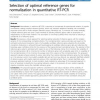Free Online Productivity Tools
i2Speak
i2Symbol
i2OCR
iTex2Img
iWeb2Print
iWeb2Shot
i2Type
iPdf2Split
iPdf2Merge
i2Bopomofo
i2Arabic
i2Style
i2Image
i2PDF
iLatex2Rtf
Sci2ools
BMCBI
2010
2010
Selection of optimal reference genes for normalization in quantitative RT-PCR
Background: Normalization in real-time qRT-PCR is necessary to compensate for experimental variation. A popular normalization strategy employs reference gene(s), which may introduce additional variability into normalized expression levels due to innate variation (between tissues, individuals, etc). To minimize this innate variability, multiple reference genes are used. Current methods of selecting reference genes make an assumption of independence in their innate variation. This assumption is not always justified, which may lead to selecting a suboptimal set of reference genes. Results: We propose a robust approach for selecting optimal subset(s) of reference genes with the smallest variance of the corresponding normalizing factors. The normalizing factor variance estimates are based on the estimated unstructured covariance matrix of all available candidate reference genes, adjusting for all possible correlations. Robustness is achieved through bootstrapping all candidate reference ge...
Related Content
| Added | 08 Dec 2010 |
| Updated | 08 Dec 2010 |
| Type | Journal |
| Year | 2010 |
| Where | BMCBI |
| Authors | Inna Chervoneva, Yanyan Li, Stephanie Schulz, Sean Croker, Chantell Wilson, Scott A. Waldman, Terry Hyslop |
Comments (0)

